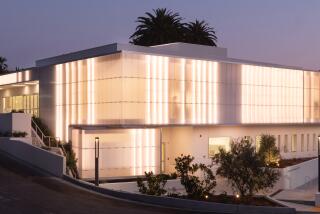A sensuous upholding of the family tradition
- Share via
The new Glorya Kaufman Dance Theater at UCLA puts the audience so close to the performers that it proved an ideal location for Aniruddha Knight’s Bharata Natyam dance concert Friday.
Built in 1932 and originally known as the Women’s Gymnasium -- it was named the Dance Building in 1984 -- the building retains its outward Italian Romanesque design. But inside, it has turned clean, modern, polished and airy.
The Kaufman Theater, on the second floor, seats 200 on a raked floor and an additional 100 on a balcony. The rows of seats are placed along the long end of a rectangle. There is little barrier between audience and performers, so one could hear Aniruddha singing along with the musicians.
He is the ninth -- some sources say 10th -- generation of a family that established its own style of Bharata Natyam, a southern Indian classical dance idiom. His grandmother, T. Balasaraswati, was the first of the family invited to dance and teach in the United States in 1962. His mother, Lakshmi Knight, who performed at UCLA in 1999, died in 2001.
Aniruddha, who turned 25 last week, is still a very young exponent of this extraordinarily demanding solo style. So only true experts can discern his accomplishments and deficiencies in terms of the Balasaraswati tradition. To a less trained eye, he seemed a model of grace, ease and intense involvement in projecting character.
The aspects of the family tradition that distinguish it from more familiar forms of Bharata Natyam -- at least as embodied in Aniruddha’s dancing -- may at first seem a series of negatives. It is less percussive, less abrupt in shifts, less sharp in terminations and less deep and tense in turned-out knee bends.
On the other hand, it is extraordinarily sensuous, vividly independent in asymmetrical balances and positions, and extremely personal in its storytelling.
Many of the stories involve female characters in relation to Hindu gods. From the Hindu point of view, as explained in helpful introductory remarks by drummer Douglas Knight (Aniruddha’s father), god is masculine and humanity is feminine. This idea elevates much of the longing, coyness and sense of loss so well limed by Aniruddha to a higher level.
In addition to Douglas Knight, the musicians included vocalists Vidya Sankaranarayanan and Usha Shivakumar, and flutist T.R. Moorthy.
More to Read
The biggest entertainment stories
Get our big stories about Hollywood, film, television, music, arts, culture and more right in your inbox as soon as they publish.
You may occasionally receive promotional content from the Los Angeles Times.










